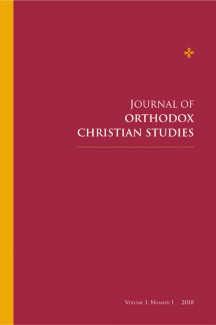
Johns Hopkins UniversityEst. 1876
America’s First Research University
Putting Orthodox Studies on the Radar

Earlier this year, the JHU Press published the first issue of a new journal The Journal of Orthodox Christian Studies. An initiative of the Orthodox Christian Studies Center of Fordham University, the journal will publish leading scholarship on all aspects of the thought, history, society, politics, theology and culture of Orthodox Christianity broadly conceived.
Journal editors George E. Demacopoulos (Fordham University) and Vera Shevzov (Smith College) agreed to publish the introduction to the inaugural issue on the blog.
Often associated with the qualifier "Eastern" and perceived as the Christian "other" in the context of contemporary world Christianity, Orthodox Christianity has historically remained largely off the curricular and scholarly radars of American academics. Yet, from late antiquity to modern times, as persecuted minorities, subjects of state-supported imperial regimes, or immigrants to "foreign lands," Orthodox Christians have made some of the most significant and lasting contributions to the visual arts, literature, music, philosophy and theology, among other fields. Equally significant, yet politically more contentious, is the fact that Orthodoxy, in all its distinctive permutations, has historically offered a host of alternatives to the more familiar Western European narratives of the history of Christianity, as well as the histories of traditionally Orthodox countries and cultures.

As a field, Orthodox Christian Studies connects an archipelago of cultural and religious traditions that for centuries were the dominant forms of Christianity throughout Asia Minor, the Balkans, Eastern Europe, the Middle East, and Russia. And while there is creative scholarly work devoted to the study of Orthodox Christianity in these regions and elsewhere, most of that work is conducted in relative isolation. Highly fragmented by methodology (e.g. anthropology, history, political science, or religious studies), area studies (e.g. Byzantine Studies, Near Eastern Studies, or East European and Eurasian Studies), and periodization (e.g. late antiquity, medieval, pre-modern, modern, and post-modern), the modern academy often compartmentalizes scholars whose work has transnational and interdisciplinary implications and consequences.
The Journal of Orthodox Christian Studies is a deliberate effort to bring these often disparate scholarly communities into conversation with one another. Our hope is that, in doing so, the journal will identify unexplored connections and untapped research possibilities, problematize simplistic, romantic, or orientalist views and interpretations, help facilitate informed scholarly debate, and provide an intellectual resource for those who know little about this field as well as for the communities under investigation.
The Journal of Orthodox Christian Studies is housed within the Orthodox Christian Studies Center of Fordham University and, true to the Center's ecumenical vision, defines "Orthodox Christianity" broadly so as to make no distinction between Chalcedonian and Miaphysite churches for the purpose of determining topics of scholarly investigation. The editorial team is committed to interdisciplinary and multi-disciplinary research, and welcomes scholarship in anthropology, art history and archeology, classics, history, philosophy, political science, religious studies, religion and science, sociology, and theology. The editors will impose no chronological, geographic, or methodological boundaries on the academic investigation of Orthodox Christian Studies, so long as the research illuminates some aspect of the history, thought, or culture of the Orthodox Christian world broadly understood.
The Journal of Orthodox Christian Studies is committed to publishing original research and book reviews. Occasionally, the editors will consider review essays, translations of short texts that will have significant impact on the field of Orthodox Christian Studies, and field reports of important events (such as Pan-Orthodox Synods or conferences) occurring in Eastern Europe or the Middle East. We also anticipate that some issues will have guest editors and be dedicated to a specific theme or sub-field (e.g., religious politics in the Balkans, human rights in Eastern Europe, or the disappearance of Christianity in the Middle East).
We look forward to your submissions and invite your suggestions, input, and engagement in this new endeavor.


